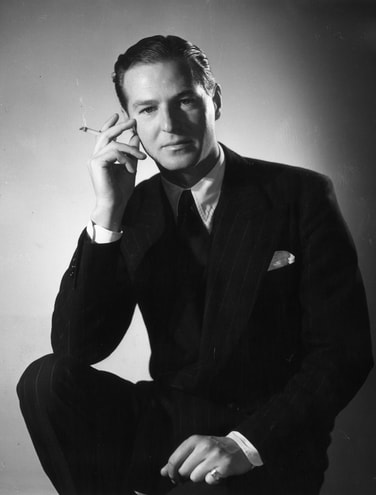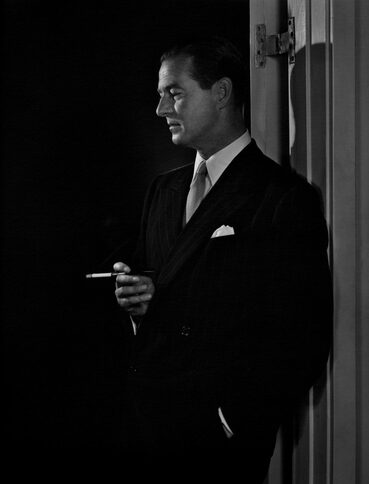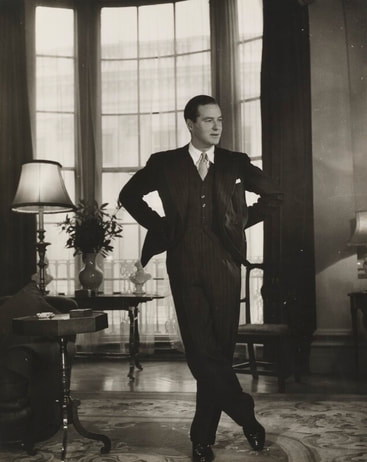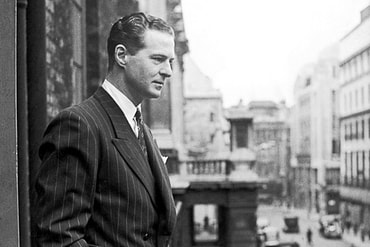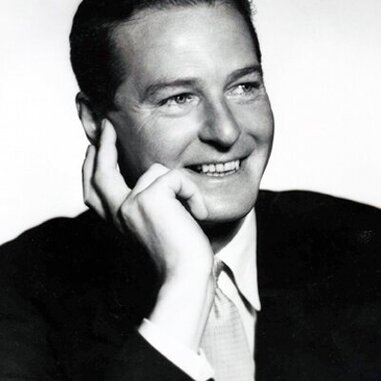|
Sir Terence Mervyn Rattigan CBE (10 June 1911 – 30 November 1977) was a British dramatist and screenwriter. His plays are typically set in an upper-middle-class background. He wrote The Winslow Boy (1946), The Browning Version (1948), The Deep Blue Sea (1952) and Separate Tables (1954), among many others.
A troubled homosexual who saw himself as an outsider, Rattigan wrote a number of plays which centred on issues of sexual frustration, failed relationships, or a world of repression and reticence. Biography
Terence Rattigan was born in 1911 in South Kensington, London, of Irish Protestant extraction. Rattigan's birth certificate and his birth announcement in The Times indicate he was born on 9 June 1911. However, most reference books state that he was born the following day; Rattigan himself never publicly disputed this date. There is evidence suggesting that the date on the birth certificate is incorrect. He was given no middle name, but he adopted the middle name "Mervyn" in early adulthood.
He had an elder brother, Brian. They were the grandsons of Sir William Henry Rattigan, an India-based jurist, and later a Liberal Unionist Member of Parliament for North-East Lanarkshire. His father was Frank Rattigan CMG, a diplomat whose exploits included an affair with Princess Elisabeth of Romania (future consort of King George II of Greece) which resulted in her having an abortion. The Royal House of Romania is considered to be the inspiration of Rattigan's play The Sleeping Prince.
Rattigan was educated at Sandroyd School from 1920 to 1925, and Harrow School. Rattigan played cricket for the Harrow First XI and scored 29 in the Eton–Harrow match in 1929. He then went to Trinity College, Oxford.
His success as a playwright came early, with the comedy French Without Tears in 1936 which was inspired by his 1933 visit to a village called Marxzell in the Black Forest, where young English gentlemen went to learn German.
Rattigan's determination to write a more serious play produced After the Dance (1939), a satirical social drama about the "bright young things" and their failure to politically engage. The outbreak of the Second World War scuppered any chances of a long run. During the war, Rattigan served in the Royal Air Force as a tail gunner. After the war, Rattigan alternated between comedies and dramas, establishing himself as a major playwright: the most successful of which were The Winslow Boy (1946), The Browning Version (1948), The Deep Blue Sea (1952), and Separate Tables (1954). Rattigan's belief in understated emotions and craftsmanship was deemed old fashioned after the overnight success in 1956 of John Osborne's Look Back in Anger began the era of kitchen sink dramas by the writers known as the Angry Young Men. Rattigan responded to this critical disfavour with some bitterness. His plays Ross, Man and Boy, In Praise of Love, and Cause Célèbre, however show no sign of any decline in his talent. Rattigan explained that he wrote his plays to please a symbolic playgoer, "Aunt Edna", someone from the well-off middle-class who had conventional tastes.
Rattigan was gay, with numerous lovers but no long-term partners.
It has been claimed his work is essentially autobiographical, containing coded references to his sexuality, which he kept secret from all but his closest friends. Rattigan was fascinated with the life and character of T. E. Lawrence. In 1960 he wrote a play called Ross, based on Lawrence's exploits. Preparations were made to film it, and Dirk Bogarde accepted the role. However, it did not proceed because the Rank Organisation withdrew its support, not wishing to offend David Lean and Sam Spiegel, who had started to film Lawrence of Arabia. Bogarde called Rank's decision "my bitterest disappointment". The same year, a musical version of French Without Tears was staged as Joie de Vivre, with music by Robert Stolz of White Horse Inn fame. It starred Donald Sinden, lasted only four performances, and has never been revived. Rattigan was diagnosed as having leukaemia in 1962 and recovered two years later, but fell ill again in 1968. He disliked the so-called Swinging London of the 1960s and moved abroad, living in Bermuda, where he lived off the proceeds from lucrative screenplays including The V.I.P.s and The Yellow Rolls-Royce. For a time he was the highest-paid screenwriter in the world. In 1964, Rattigan invested £3,000 in young playwright Joe Orton's outrageous comedy Entertaining Mr Sloane, trying to get the play transferred to the West End. Although an unlikely champion of the risqué Orton, Rattigan recognised the younger man's talent and approved of what he considered a very well written piece of theatre. Rattigan was knighted in the Queen's Birthday Honours of June 1971 for services to the theatre, being only the fourth playwright to be knighted in the 20th century (after Sir W. S. Gilbert in 1907, Sir Arthur Wing Pinero in 1909 and Sir Noël Coward in 1970). He had previously been appointed Commander of the Order of the British Empire (CBE), in June 1958. He moved back to Britain, where he experienced a minor revival in his reputation before his death.
Terence Rattigan died in Hamilton, Bermuda, from bone cancer in 1977, aged 66. His cremated remains were deposited in the family vault at Kensal Green Cemetery.
In 1990, the British Library acquired Rattigan's papers consisting of 300 volumes of correspondence and papers relating to his prose and dramatic works.
There was a revival of of his plays since early 90s, In 2011, the BBC presented The Rattigan Enigma by Benedict Cumberbatch, a documentary on Rattigan's life and career presented by actor Benedict Cumberbatch, who, like Rattigan, attended Harrow. A new screen version of The Deep Blue Sea, directed by Terence Davies, was released in 2011, starring Rachel Weisz and Tom Hiddleston. Further interest
Books
0 Comments
Leave a Reply. |
Categories
All
Archives
December 2023
|
